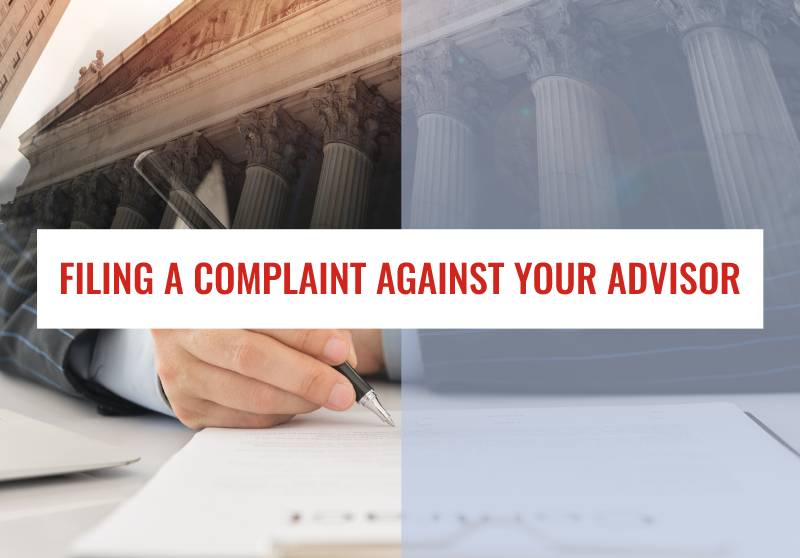When you hire a financial advisor, you expect the advisor to act in your best interest to prevent unnecessary losses. Unfortunately, however, financial advisors do not always live up to these expectations.
In some cases, a financial advisor fails to follow an investor’s requests and guidelines or otherwise engages in misconduct, causing the investor to suffer losses. When this happens, the investor may be able to file an official complaint against the financial advisor.
In this article you will learn how to file a complaint against a financial advisor to recover your losses.
How to File a Complaint Against a Financial Advisor

If you have a problem with your financial advisor, you can file a formal complaint online with both the Financial Industry Regulatory Authority (FINRA) and the Securities and Exchange Commission (SEC). You can also call the SEC’s toll-free investor assistance line at (800) 732-0330.
Investment Losses? Let’s talk.or, give us a ring at 561-338-0037.
IMPORTANT: If you or a loved one has suffered significant investment losses at the hands of your financial advisor, it’s important that you file a well-organized and strong initial advisor complaint. The FINRA arbitration lawyers at The Law Offices of Robert Wayne Pearce, P.A. have over 45 years of experience with investment loss recovery. We can help you understand when and how to file a complaint against an advisor. Give us a call to discuss your case, and see what our team can do for you.
A Brief Overview of FINRA and How It Affects Your Ability to File a Complaint Against a Financial Advisor
Before discussing how to file a complaint against an advisor, it is important to have an understanding of the process in general and whether you can bring a claim at all.
Financial advisors and their employers are governed by the Financial Industry Regulatory Authority (FINRA). FINRA’s stated mission is to “safeguard the investing public against fraud and bad practices.” FINRA has the power to take disciplinary actions against registered financial advisors or broker-dealers who violate the industry’s rules.
In 2020, FINRA reported that it initiated 808 disciplinary actions, levied $57.0 million in fines, and ordered restitution of $25.2 million be paid to investors. FINRA also expelled 2 member firms, suspended 2 member firms, barred 246 individuals from the securities industry, and suspended 415 individuals.
In short, FINRA provides significant protections for investors and processes through which advisors can be held accountable for their misconduct. However, it is important to note that you may not be able to file a complaint against an advisor in court as you might expect.
Required Investor Arbitration
When you open a brokerage account with a member firm regulated by FINRA, you will likely sign a customer agreement. This agreement controls many aspects of the investor-advisor relationship, including potential disputes you may have with your advisor or their firm in the future.
More often than not, these customer agreements contain a mandatory arbitration clause. An investor must arbitrate through FINRA when:
- There is a written arbitration agreement;
- The dispute is with a broker or firm who is a member of FINRA; and
- The dispute is related to the securities business of the broker or firm.
If all these are true, then you must bring any claim you may have against your broker or their firm to FINRA arbitration, rather than filing a lawsuit in the court system. Nevertheless, you do still have an opportunity for your claim to be heard and to hold your advisor accountable.
How FINRA Arbitration Works
Many people believe that going to court is the best way to hold a financial advisor accountable. However, this is not necessarily the case. In fact, FINRA arbitration is much more common than you might think.
Arbitration is an alternative dispute resolution method that allows parties to a legal dispute to resolve their issues outside of court. Much like in a court case, the parties file pleadings, present testimony and evidence, and make oral arguments.
The key difference between a trial and arbitration is the forum. Whereas a trial is presented in front of a judge or jury, an arbitration is presented before a panel of independent arbitrators chosen by the parties.
However, just as a judge or jury renders a final judgment at trial, an arbitration panel also renders a final and binding award on the parties in the arbitration. Thus, arbitration can still be an effective method of resolving your claims with a financial advisor.
When Can I File a FINRA Complaint Against a Financial Advisor?
Just because you lost money on an investment does not necessarily mean you should file a complaint against your financial advisor. Rather, you must show that you lost money because of your financial advisor’s negligence or misconduct.
Some of the most common types of investment fraud for which you may be able to file a complaint against your financial advisor include:
- Ponzi schemes,
- Pyramid schemes,
- “Pump and dump” scams,
- Advance fee fraud,
- High yield investment frauds, and
- Offshore scams.
Additionally, financial advisors have a fiduciary duty to their investors to reasonably invest and manage their investments. If your financial advisor breaches his or her duty, resulting in monetary loss, you may be entitled to file a complaint.
Of course, there are many ways in which a financial advisor can commit misconduct. For more information on what constitutes a breach of duty by a financial advisor, read our post, Can I Sue My Financial Advisor Over Losses?
Investment Losses? We Can Help
Discuss your legal options with an attorney at The Law Offices of Robert Wayne Pearce, P.A.
or, give us a ring at (800) 732-2889.


Filing Your Complaint Against a Financial Advisor
The first step in initiating your complaint is completing what is called a “statement of claim.” The statement of claim details what occurred in your particular case.
This is your opportunity to tell FINRA your side of the story, so it is imperative that it is as complete and detailed as possible. You then submit your statement of claim to FINRA, after which time the case will move forward.
The steps following the filing of your complaint include:
- The filing of an answer by the opposing party,
- Arbitrator selection,
- Prehearing conferences,
- Discovery,
- The arbitration hearing, and
- Final decision and awards.
FINRA’s arbitration process can be faster and less formal than a court trial. However, it is still helpful to have an experienced attorney in your corner.
An investment fraud attorney can help you draft and file your statement of claim. This is arguably one of the most important parts of the FINRA arbitration process.
Additionally, an attorney can assist you in gathering evidence and arguing the merits of your case at your arbitration hearing. Thus, having an experienced attorney’s assistance can be a great asset to you as you file a complaint against your financial advisor.
Want More Information on How to File a Complaint Against an Advisor?
Contact a qualified investment fraud attorney to assist you as you navigate this process.
Filing a complaint against a financial advisor can be a complex and time-consuming process. Our experienced attorneys are here to help.
The Law Offices of Robert Wayne Pearce, P.A., represents clients on all sides of securities, commodities, and investment-related disputes. We have decades of experience helping clients in courtroom litigation, arbitration, and mediation proceedings. Contact us today for a free consultation to discuss your case, and see what our investment fraud attorneys can do for you.
